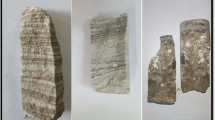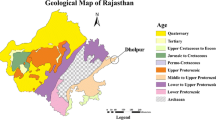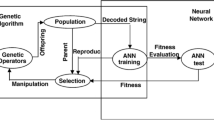Abstract
A realistic analysis of rock deformation in response to any change in stresses is heavily dependent on the reliable determination of the rock properties as analysis inputs. Young’s modulus (E) provides great insight into the magnitude and characteristics of the rock mass/material deformation, but direct determination of Young’s modulus in the laboratory is time-consuming and costly. Therefore, basic rock properties such as point load strength index, P-wave velocity and Schmidt hammer rebound number have been used to estimate Young’s modulus. These rock properties can be easily measured in the laboratory. The main aim of this study was to develop two intelligent models based upon fuzzy logic and biological nervous systems in order to estimate Young’s modulus of sandstone for a set of known index properties drawn from laboratory tests. The database required to construct these models comprised a series of drill cores (96 samples of sandstone) from site investigation operations for a hydroelectric roller-compacted concrete (RCC) dam located in the Malaysian state of Sarawak. In the final stage of the present study, using the same data sets, multiple regression (MR) analysis was also proposed for comparison with the prediction results of both the fuzzy inference system (FIS) and artificial neural network (ANN) models. The ANN model was found to be far superior to FIS and MR in terms of several performance indices including root-mean-square error and ranking. Thus, from the results of this study, it was concluded that the models proposed herein could be utilised to estimate the E of similar rock types in practice.















Similar content being viewed by others
References
Armaghani DJ, Amin MFM, Yagiz S, Faradonbeh RS, Abdullah RA (2016) Prediction of the uniaxial compressive strength of sandstone using various modeling techniques. Int J Rock Mech Min Sci 85:174–186
Bai Y, Zhuang H, Wang D (2007) Advanced fuzzy logic technologies in industrial applications. Springer Science & Business Media, London
Barton N (2002) Some new Q value correlations to assist in site characterisation and tunnel design. Int J Rock Mech Min Sci 39:185–216
Barton N, Lien R, Lunde J (1974) Engineering classification of rock masses for the design of tunnel support. Rock Mech 6(4):189–236
Beiki M, Majdi A, Givshad AD (2013) Application of genetic programming to predict the uniaxial compressive strength and elastic modulus of carbonate rocks. Int J Rock Mech Min Sci 63:159–169
Bieniawski ZT (1973) Engineering classification of rock masses. Trans S African Inst Civ Engrs 15(12):335–344
Bieniawski ZT (1978) Determining rock mass deformability—experience from case histories. Int J Rock Mech Min Sci Geomech Abstr 15:237–247
Chiu SL (1994) Fuzzy model identification based on cluster estimation. J Intell Fuzzy Syst 2:267–278
Cybenko J (1989) Approximations by superpositions of a sigmoidal function. Math Control Signal Syst 2:303–314
Dehghan S, Sattari GH, Chehreh CS, Aliabadi MA (2010) Prediction of unconfined compressive strength and modulus of elasticity for Travertine samples using regression and artificial neural. New Min Sci Technol 20:0041–0046
Diederichs MS, Kaiser PK (1999) Stability of large excavations in laminated hard rockmasses: the Voussoir analogue revisited. Int J Rock Mech Min Sci 36:97–117
Dincer I, Acar A, Cobanoglu I, Uras Y (2004) Correlation between Schmidt hardness, uniaxial compressive strength and Young’s modulus for andesites, basalts and tuffs. Bull Eng Geol Environ 63:141–148
Feng XT, Hudson JA (2004) The ways ahead for rock engineering design methodologies. Int J Rock Mech Min Sci 41(2):255–273
Feng XT, Hudson JA (2010) Specifying the information required for rock mechanics modelling and rock engineering design. Int J Rock Mech Min Sci 47(2):179–194
Gokceoglu C, Zorlu K (2004) A fuzzy model to predict the unconfined compressive strength and modulus of elasticity of a problematic rock. Eng Appl Artif Intell 17:61–72
Hagan MT, Menhaj MB (1994) Training feed forward networks with the Marquardt algorithm. IEEE Trans Neural Netw 5:861–867
Haykin S (1999) Neural networks, 2nd edn. Prentice-Hall, Englewood Cliffs
Hecht-Nielsen R (1987) Kolmogorov’s mapping neural network existence theorem. In: Proceedings of the first IEEE international conference on neural networks, San Diego, CA, USA, pp 11–14
Hoek E, Brown ET (1997) Practical estimates of rock mass strength. Int J Rock Mech Min Sci 34(8):1165–1186
Hoek E, Diederichs MS (2006) Empirical estimation of rock mass modulus. Int J Rock Mech Min Sci 43:203–215
Hornik K, Stinchcombe M, White H (1989) Multilayer feedforward networks are universal approximators. Neural Netw 2:359–366
Hudson JA, Feng XT (2007) Updated flowcharts for rock mechanics modelling and rock engineering design. Int J Rock Mech Min Sci 44(2):174–195
ISRM (2007) The complete ISRM suggested methods for rock characterization, testing and monitoring: 1974–2006. In: Ulusay R, Hudson JA (eds) Suggested methods prepared by the commission on testing methods, international society for rock mechanics, compilation arranged by the ISRM Turkish National Group, Ankara, Turkey
Jahed Armaghani D, Tonnizam Mohamad E, Momeni E, Narayanasamy MS, Mohd Amin MF (2014) An adaptive neuro-fuzzy inference system for predicting unconfined compressive strength and Young’s modulus: a study on Main Range granite. Bull Eng Geol Environ. doi:10.1007/s10064-014-0687-4
Jahed Armaghani D, Mohamad ET, Hajihassani M, Yagiz S, Motaghedi H (2015) Application of several non-linear prediction tools for estimating uniaxial compressive strength of granitic rocks and comparison of their performances. Eng Comput. doi:10.1007/s00366-015-0410-5
Jahed Armaghani D, Mohamad ET, Momeni E, Monjezi M, Narayanasamy MS (2016) Prediction of the strength and elasticity modulus of granite through an expert artificial neural network. Arab J Geosci 9(1):1–16. doi:10.1007/s12517-015-2057-3
Jain AK, Dubes RC (1988) Algorithms for clustering data. Prentice-Hall, Englewood Cliffs
Jain AK, Murty MN, Flynn PJ (1999) ACM Computing Surveys, Vol. 31, No. 3, September
Jang JSR, Sun CT, Mizutani E (1997) Neuro-fuzzy and soft computing: a computational approach to learning and machine intelligence. Prentice Hall, Inc, Englwood Cliffs, NJ
Kaastra I, Boyd M (1996) Designing a neural network for forecasting financial and economic time series. Neurocomputing 10:215–236
Kahraman S, Gunaydin O, Alber M, Fener M (2009) Evaluating the strength and deformability properties of Misis Fault Breccia using Artificial Neural Networks. Expert Syst Appl 36(3):6874–6878
Kanellopoulas I, Wilkinson GG (1997) Strategies and best practice for neural network image classification. Int J Remote Sens 18:711–725
Lashkaripour GR (2002) Predicting mechanical properties of mudrock from index parameters. Bull Eng Geol Environ 61:73–77
Leite MH, Ferland F (2001) Determination of unconfined compressive strength and Young’s modulus of porous materials by indentation tests. Eng Geol 59:267–280
Looney CG (1996) Advances in feed-forward neural networks: demystifying knowledge acquiring black boxes. IEEE Trans Knowl Data Eng 8(2):211–226
Majdi A, Beiki M (2010) Evolving neural network using a genetic algorithm for predicting the deformation modulus of rock masses. Int J Rock Mech Min Sci 47(2):246–253
Mamdani EH, Assilian S (1975) An experimental in linguistic synthesis with a fuzzy logic control. Int J Man-Mach Stud 7:1–13
Martin DM, Stimpson B (1994) The effect of sample disturbance on laboratory properties of Lac du Bonnet granite. Can Geotechn J 31(5):692–702
Masters T (1994) Practical neural network recipes in C++. Academic, Boston
MATLAB user’s guide (2007) Fuzzy logic Toolbox user’s guide (MATLAB CD-ROM). Mathworks Inc, Natick, p 299
McCulloch WS, Pitts W (1943) A logical calculus of the ideas immanent in nervous activity. Bull Math Biophys 5:115–133
Mishra DA, Basu A (2013) Estimation of uniaxial compressive strength of rock materials by index tests using regression analysis and fuzzy inference system. Eng Geol 160:54–68
Mishra DA, Srigyan M, Basu A, Rokade PJ (2015) Soft computing methods for estimating the uniaxial compressive strength of intact rock from index tests. Int J Rock Mech Min Sci 80:418–424
Mitri HS, Edrissi R, Henning J (1994) Finite element modeling of cable bolted stopes in hard rock ground mines. In: Presented at the SME annual meeting, New Mexico, Albuquerque, pp 94–116
Mohamad ET, Armaghani DJ, Momeni E, Abad SVANK (2015) Prediction of the unconfined compressive strength of soft rocks: a PSO-based ANN approach. Bull Eng Geol Environ 4:745–757
Momeni E, Jahed Armaghani D, Hajihassani M, Amin MFM (2015) Prediction of uniaxial compressive strength of rock samples using hybrid particle swarm optimization-based artificial neural networks. Measurement 60:50–63
Moradian ZA, Behnia M (2009) Predicting the uniaxial compressive strength and static Young’s modulus of intact sedimentary rocks using the ultrasonic test. Int J Geomech 9(1):14–19
Nefeslioglu HA (2013) Evaluation of geo-mechanical properties of very weak and weak rock materials by using non-destructive techniques: ultrasonic pulse velocity measurements and reflectance spectroscopy. Eng Geol 160:8–20
Nicholson GA, Bieniawski ZT (1990) A nonlinear deformation modulus based on rock mass classification. Int J Min Geol Eng 8:181–202
Paola JD (1994) Neural network classification of multispectral imagery. MSc thesis, The University of Arizona, USA
Read SAL, Richards LR, Perrin ND (1999) Applicability of the Hoek–Brown failure criterion to New Zealand greywacke rocks, vol 2. In: Proceedings 9th Int. Society for Rock Mechanics Congress, Paris, pp 655–660
Rezaei M, Majdi A, Monjezi M (2012) An intelligent approach to predict unconfined compressive strength of rock surrounding access tunnels in longwall coal mining. Neural Comput Appl 24(1):233–241
Ripley BD (1993) Statistical aspects of neural networks. In: Barndoff- Neilsen OE, Jensen JL, Kendall WS (eds) Networks and chaos-statistical and probabilistic aspects. Chapman and Hall, London, pp 40–123
Rutkowski L (2004) Flexible neuro-fuzzy systems: structures, learning and performance evaluation. Kluwer Academic, New York
Sachpazis CI (1990) Correlating Schmidt hardness with compressive strength and Young’s modulus of carbonate rocks. Bull Int Assoc Eng Geol 42:75–84
Serafim JL, Pereira JP (1983) Considerations of the geomechanics classification of Bieniawski. In: Proceedings of the International Symposium on Engineering Geology and Underground Construction, Laboratorio National De Engenharia Civil, Lisbon, Spain. A.A. Balkema, Rotterdam, the Netherlands, vol 1, pp 1133–1142
Shams S, Monjezi M, Johari Majd V, Jahed Armaghani D (2015) Application of fuzzy inference system for prediction of rock fragmentation induced by blasting. Arab J Geosci 8:10819–10832
Simpson P (1990) Artificial neural system: foundation, paradigms, applications and implementations. Pergamon, New York
Singh R, Kainthola A, Singh TN (2012) Estimation of elastic constant of rocks using an ANFIS approach. Appl Soft Comput 12(1):40–45
Sivanandam SN, Sumathi S, Deepa SN (2007) Introduction to fuzzy logic using MATLAB. Springer, Berlin, Heidelberg
Sonmez H, Gokceoglu C, Ulusay R (2004) Indirect determination of the modulus of deformation of rock masses based on the GSI system. Int J Rock Mech Min Sci 1:849–857
Sonmez H, Gokceoglu C, Nefeslioglu HA, Kayabasi A (2006) Estimation of rock modulus: for intact rocks with an artificial neural network and for rock masses with a new empirical equation. Int J Rock Mech Min Sci 43:224–235
SPSS Inc (2007) SPSS for Windows (Version 16.0). SPSS Inc, Chicago
Swingler K (1996) Applying neural networks: a practical guide. Academic, New York
Takagi T, Sugeno M (1985) Identification of systems and its application to modeling and control. IEEE Trans Syst Man Cybern 15:116–132
Wang C (1994) A theory of generalization in learning machines with neural application. PhD thesis, The University of Pennsylvania, USA
Yager RR, Filev DP (1994a) Generation of fuzzy rules by mountain clustering. J Intell Fuzzy Syst 2:209–219
Yager RR, Filev DP (1994b) Essentials of fuzzy modeling and control. Wiley, New York
Yagiz S, Sezer EA, Gokceoglu C (2012) Artificial neural networks and nonlinear regression techniques to assess the influence of slake durability cycles on the prediction of uniaxial compressive strength and modulus of elasticity for carbonate rocks. Int J Numer Anal Method 36(14):1636–1650
Yasar E, Erdogan Y (2004) Correlating sound velocity with the density, compressive strength and Young’s modulus of carbonate rocks. Int J Rock Mech Min Sci 41(5):871–875
Yazdani Bejarbaneh B, Armaghani DJ, Amin MFM (2015) Strength characterisation of shale using Mohr-Coulomb and Hoek-Brown criteria. Measurement 63:269–281
Yilmaz I, Sendir H (2002) Correlation of Schmidt hardness with unconfined compressive strength and Young’s modulus in gypsum from Sivas (Turkey). Eng Geol 66(3):211–219
Yilmaz I, Yuksek AG (2008) An example of artificial neural network (ANN) application for indirect estimation of rock parameters. Rock Mech Rock Eng 41(5):781–795
Yilmaz I, Yuksek G (2009) Prediction of the strength and elasticity modulus of gypsum using multiple regression, ANN, and ANFIS models. Int J Rock Mech Min Sci 46(4):803–810
Zadeh LA (1965) Fuzzy sets. Inform. Control 8:338–353
Zadeh LA (1973) Outline of a new approach to the analysis of complex systems and decision processes. IEEE Trans Syst Man Cybern 3:28–44
Zorlu K, Gokceoglu C, Ocakoglu F, Nefeslioglu HA, Acikalin S (2008) Prediction of uniaxial compressive strength of sandstones using petrography-based models. Eng Geol 96(3):141–158
Zurada JM (1992) Introduction to artificial neural systems. West, St Paul
Author information
Authors and Affiliations
Corresponding author
Rights and permissions
About this article
Cite this article
Bejarbaneh, B.Y., Bejarbaneh, E.Y., Amin, M.F.M. et al. Intelligent modelling of sandstone deformation behaviour using fuzzy logic and neural network systems. Bull Eng Geol Environ 77, 345–361 (2018). https://doi.org/10.1007/s10064-016-0983-2
Received:
Accepted:
Published:
Issue Date:
DOI: https://doi.org/10.1007/s10064-016-0983-2




